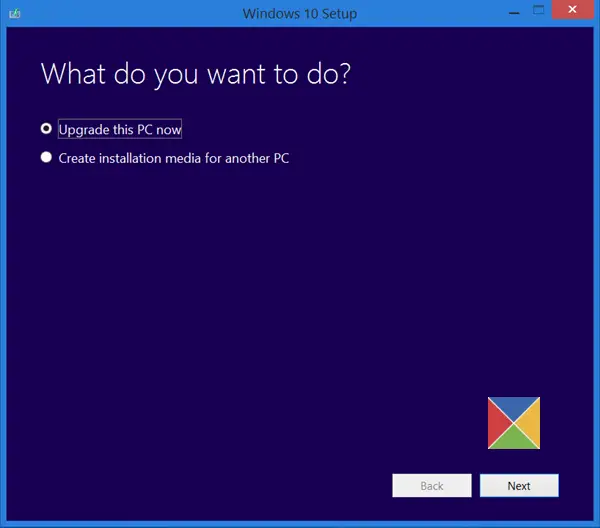You would want to upgrade from Windows 7 to Windows 10 because of the fact that, Windows 7 is reaching its end of support in January 2020 and will no longer get security updates. Microsoft recommends upgrading to Windows 10 only due to the fact that is a robust new operating system that follows a different servicing model. You should consider upgrading Windows 7 to Windows 10, as it will be difficult to secure Widows 7 after End Of Support.
Upgrade Windows 7 to Windows 10 without losing data
Two of the main methods that help you upgrade your PC from Windows 7 to Windows 10 without losing data are as follows:
1] Upgrade Windows 7 to Windows 10 using Media Creation Tool
Once you have made the selection, you need to follow the wizard, the details of which have been explained below in detail. Now, you will be asked if you want to Keep personal files and apps. Make sure you check those boxes.
When you proceed, it will start downloading the latest build of Windows 10 for your computer and then will upgrade you to Windows 10 without deleting any of your personal files. Read: Windows 7 to Windows 10 Migration Tools.
2] Upgrade Windows 7 using the latest Windows 10 ISO file
The setup will begin, and you will be asked if you want to download updates now or later.
If you wish to get the latest driver updates first, select Next.
It will be then followed by, the setup getting a few things ready.
Once you are all set, you will be asked to Accept the license terms.
Click on Accept to proceed. You will see a Making sure message. The setup will make sure that your PC is ready to install. If anything requires your attention, it will be highlighted.
It could be a message about Language Packs, media Center or anything else. Here you can also click on the Choose what to keep link-
Keep personal files, apps, and Windows settingsKeep personal files onlyNothing.
Select Keep personal files, apps, and Windows settings.
Click on Confirm > Next. The setup will check if your PC has enough space and then a Ready to install message.
Click on Install to proceed. Your computer will commence installation and restart several times.
Finally, you will see the following screen at boot.
Once the upgrade is completed, you will see the following welcome screen. After logging for the first time, you may see the following screen. You can click on Use Express setting, or you may Customize.
You will be informed about the new apps in Windows 10. You may choose your default apps here or move on.
Finally, after a few ‘Taking care of a few things’ messages, you will be taken to your Windows 10 desktop screen.
I hope you found this guide easy to follow.
Can I upgrade from Windows 7 to Windows 11 free?
You will have the option to upgrade, clean install, or reimage Windows 10 devices to move to Windows 11. For Windows 7 and Windows 8.1 devices that meet hardware requirements, you will need to clean install or reimage to go directly to Windows 11. So this means that you can perform an in-place upgrade to move from Windows 10 to Windows 11, but you will have to perform a Clean install to move from Windows 8.1/7 to Windows 11. Let us know if you have any questions.
